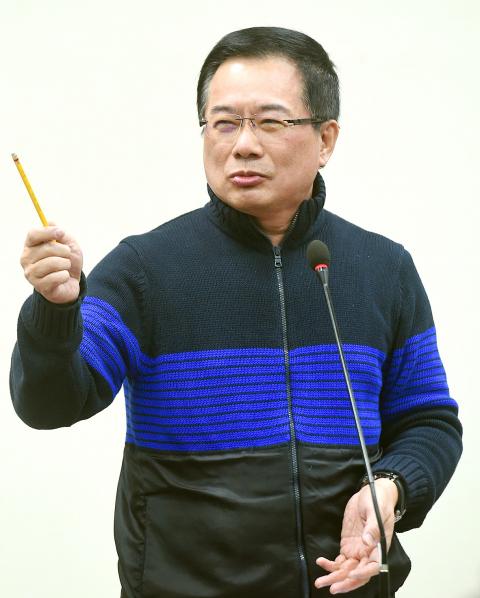A spat between Chinese Nationalist Party (KMT) Central Policy Committee director Alex Tsai (蔡正元) and former president Ma Ying-jeou’s (馬英九) office entered day three yesterday after Tsai criticized Ma for comments about the 228 Incident.
Responding to calls to punish those responsible for the deaths of tens of thousands of people during the White Terror era following the 228 Incident, Ma on Monday said at an event marking the 70th anniversary of the Incident that because Chiang Kai-shek (蔣介石) was president at the time, he “should naturally be held accountable.”
The extent of Chiang’s responsibility was up to people to determine for themselves by studying public information, Ma said.

Photo: Liao Chen-huei, Taipei Times
Tsai on Monday said that Ma is not in a position to assign responsibility for the 228 Incident, because he enjoyed “eight years of wealth and rank.”
“Ma’s small disciples” should be reminded that then-governor-general Chen Yi (陳儀), who ordered police and military action against protesters during the 288 Incident, was less corrupt than Ma, Tsai said, without saying who the “disciples” were.
Ma office spokeswoman Hsu Chiao-hsin (徐巧芯) on Thursday said Tsai was not as righteous as his comments made him appear to be, citing a ruling that found Tsai had taken shares from Central Motion Picture Corp and registered them in his own name.
Tsai lost an appeal to overturn the ruling and in May last year was ordered to pay the corporation NT$170 million (US$5.48 million).
“If you want to talk about who is most harmful to the KMT, nobody can compete with Alex Tsai,” Hsu said.
She said Tsai was harming camaraderie among party members by making unsubstantiated attacks on former party chairpersons.
“Could it be that party headquarters is going to let its officials continue to run amok?” Hsu asked, adding that if KMT Chairwoman Hung Hsiu-chu (洪秀柱) continues to indulge Tsai, it would be detrimental to the party caucus and negatively affect preparations for the May 20 party chairperson election.
Tsai said he is open to discuss his dealings with Central Motion Picture.
“However, you [Hsu] have to remember that at the end of the war, the one who would be most injured would not be Alex Tsai, but ‘he who is the greatest’ in your heart,” Tsai said, an apparent reference to Ma.
Tsai said that he was going to write a memoir about the Central Motion Picture case when he was much older, as well as a story about Somali pirates, “because both incidents involve ‘the greatest,’ but if you [Hsu] want to extend the war to infinity, I am ready,” Tsai said.

‘DENIAL DEFENSE’: The US would increase its military presence with uncrewed ships, and submarines, while boosting defense in the Indo-Pacific, a Pete Hegseth memo said The US is reorienting its military strategy to focus primarily on deterring a potential Chinese invasion of Taiwan, a memo signed by US Secretary of Defense Pete Hegseth showed. The memo also called on Taiwan to increase its defense spending. The document, known as the “Interim National Defense Strategic Guidance,” was distributed this month and detailed the national defense plans of US President Donald Trump’s administration, an article in the Washington Post said on Saturday. It outlines how the US can prepare for a potential war with China and defend itself from threats in the “near abroad,” including Greenland and the Panama

A wild live dugong was found in Taiwan for the first time in 88 years, after it was accidentally caught by a fisher’s net on Tuesday in Yilan County’s Fenniaolin (粉鳥林). This is the first sighting of the species in Taiwan since 1937, having already been considered “extinct” in the country and considered as “vulnerable” by the International Union for Conservation of Nature. A fisher surnamed Chen (陳) went to Fenniaolin to collect the fish in his netting, but instead caught a 3m long, 500kg dugong. The fisher released the animal back into the wild, not realizing it was an endangered species at

The High Prosecutors’ Office yesterday withdrew an appeal against the acquittal of a former bank manager 22 years after his death, marking Taiwan’s first instance of prosecutors rendering posthumous justice to a wrongfully convicted defendant. Chu Ching-en (諸慶恩) — formerly a manager at the Taipei branch of BNP Paribas — was in 1999 accused by Weng Mao-chung (翁茂鍾), then-president of Chia Her Industrial Co, of forging a request for a fixed deposit of US$10 million by I-Hwa Industrial Co, a subsidiary of Chia Her, which was used as collateral. Chu was ruled not guilty in the first trial, but was found guilty

DEADLOCK: As the commission is unable to forum a quorum to review license renewal applications, the channel operators are not at fault and can air past their license date The National Communications Commission (NCC) yesterday said that the Public Television Service (PTS) and 36 other television and radio broadcasters could continue airing, despite the commission’s inability to meet a quorum to review their license renewal applications. The licenses of PTS and the other channels are set to expire between this month and June. The National Communications Commission Organization Act (國家通訊傳播委員會組織法) stipulates that the commission must meet the mandated quorum of four to hold a valid meeting. The seven-member commission currently has only three commissioners. “We have informed the channel operators of the progress we have made in reviewing their license renewal applications, and